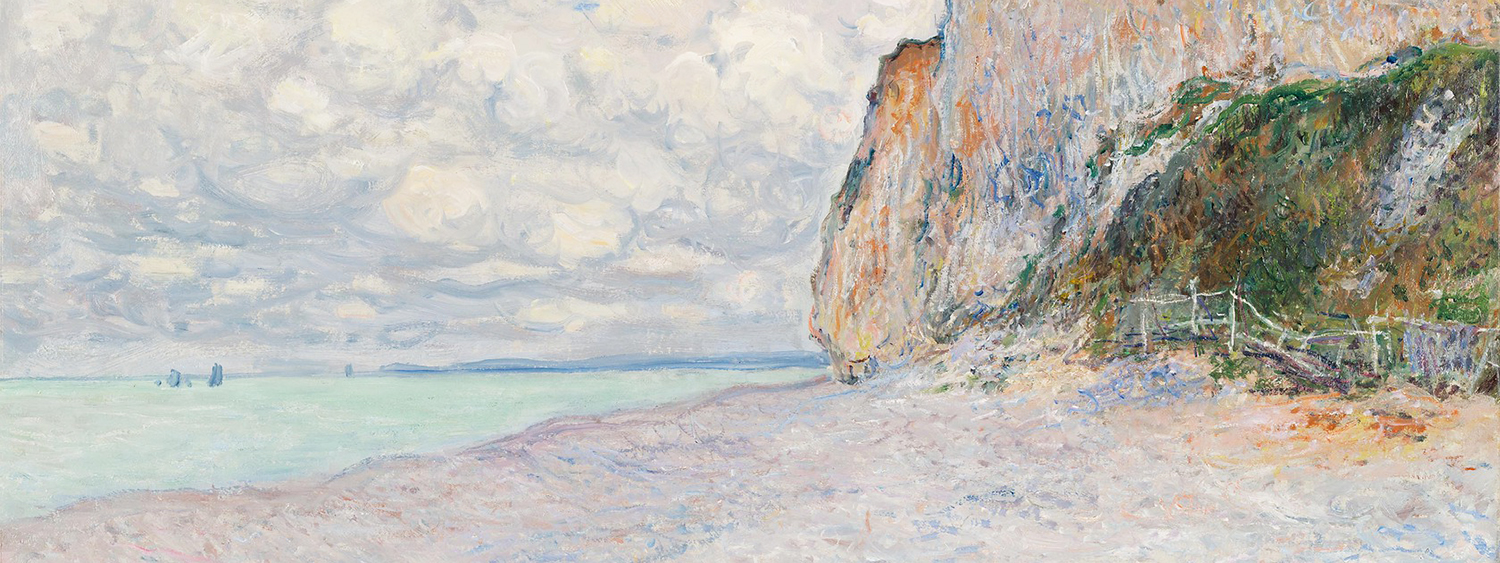implicated

Extract from Monet’s ‘Cliffs near Dieppe’ (1882), at the Carnegie Museum of Art
— It’s a dialogue, of course.
— What?
— The book I was telling you about.
— What book?
— Paul Valéry’s Idée Fixe.
— Oh?
— I really liked it. It’s charming.
— I thought it was a rush job for a doctor’s organization.
— What? Huh. Really? Well, I mean – it does read like it was written in a hurry, but it doesn’t … hm. It’s just. Well. Anyway. Even so. It was the first time I really felt an exchange of ideas in a literary dialogue. It felt real, you know? Usually it’s just a form, the ‘characters’ are mouthpieces for an idea, not … characters.
— Who’s talking?
— Now?
— No. In the Valéry dialogue.
— Oh, right. Well, there’s the sort of narrator. A bit gloomy. Misanthropic. Doomy, maybe. Likes to scramble around on rocks at the seashore.
— Not sounding like a great interlocutor.
— Not really, I guess. He runs into the doctor at the beach. Well. No. He tries to avoid the doctor who’s fishing at the beach, but they make eye contact and … you know. You can’t not say hi to someone once you’ve made eye contact like that.
— Well, you can….
— Maybe you can, but I couldn’t – and neither could the narrator.
— Ok.
— So they start talking.
— Ok.
— I mean, the doctor isn’t really fishing. He’s trying not to do anything.
— A workaholic?
— Yeah. So he goes to the beach to not work, but it’s hard. He doesn’t like it. So I think he’s glad when the narrator shows up. Lets him psychologize a bit. Feels more like work.
— I sympathize.
— Hm?
— Talking usually feels like work.
— Oh? Well, I mean…. Oh. I’m sorry. Should I…? I mean, did you want…?
— No, no. Go on.
— Ok. …Where was I?
— The doctor.
— Right. Oh. Hm. Well. At this rate I might as well just read the dialogue to you. I mean. I’ll just end up summarizing it bit by bit. And … hm.
— You said you liked how it presented ideas, while still seeming like a ‘real’ dialogue. What did you mean?
— Well, I guess… Ok. So they’re talking about how you can get stuck on this idea – the idée fixe of the title, but they end up calling it an ‘implex’, but I’m not quite sure … I might not be remembering that right. Anyhow, and it’s how you end up getting all wrapped up, tied up in this sort of knot around your idea, and you see everything in terms of the idea. It’s kind of for that reason – that he’s so tied up with his implex – that the narrator avoids all human contact and just likes to jump from pointy rock to pointy rock and kind of hopes to fall and hurt himself but doesn’t.
— Ok…?
— So it’s weird. It’s a weird dialogue. They talk a lot about medicine and medical terminology and how weird that is, and also the separation of work and hobbies and how hard that is or can be, particularly if you are interested in the work that you do, if your work is kind of your hobby.
— Ok, I can see that.
— I guess, actually, what I really like about it is how the doctor talks the narrator down from his misanthropy. Like, their conversation jumps from idea to idea, sort of free association, sort of how the narrator was jumping from rock to rock. But it’s civilizing. I think it says in the note somewhere that it’s set in the past, sort of ‘back when people could talk in complete sentences’ kind of thing, you know?
— There was a time when people talked in complete sentences?
— Well, I mean, huh… I dunno. Not usually of course, but in Valéry they do. Most of the time. What was I saying? Oh, right. The doctor and the narrator manage to find a way to relate to each other and it’s nice – they go from idea to idea to … understanding, not an understanding of each other, but a shared understanding that they built up in their conversation. Anyway. They end up going to a movie, even though the narrator starts off a total misanthrope who thinks spending time with people is trash. It’s cute. Not like ‘meet-cute’, but just … human.
— …
— Actually, come to think of it, I’m not sure any of that is right. I read it a while ago and I haven’t really looked at it since. I mean, it’s stuck with me, but I’m not sure the things that stuck with me were actually in the dialogue.
— …
— Are there any muffins left?
— I think so.
— Want one?
— Ok.
